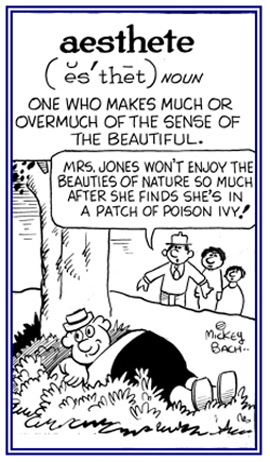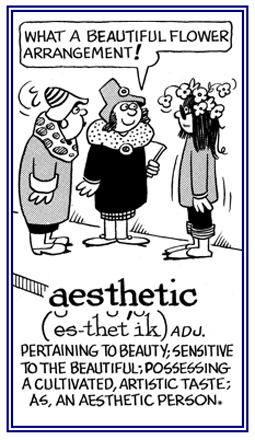aesthesiometer, esthesiometer
(s) (noun); aesthesiometers; esthesiometers
(pl)
An instrument used to determine the degree of tactile or touch sensibility that patients have: The nurse read and recorded the readings from the aesthesiometer which Dr. Sparks was using on Glen.
aesthesis, esthesis
(s) (noun); aestheses; estheses
(pl)
The perception of the external world by the senses: While standing in the meadow in springtime, the aesthesis that Mona experiences consists of the scents, the sounds, and the freshness that nature has to offer.
aesthesodic, esthesodic
(adjective): more aesthesodic, most aesthesodic; more esthesodic, most esthesodic
1. Referring to nerves that provide a path for sensory impulses: Pearl has very aesthesodic nerves and so she is very sensitive to heat and when she touches anything.
2. Concerning sensations from the external organs to the brain or nerve center: The lecture by Dr. Thomas explained the function of the aesthesodic nerves in conveying impulses from the nerves of the skin to the brain.
aesthetasc
(s) (noun), aesthetascs
(pl)
An olfactory receptor on the small antennae of some crustaceans, such as "Daphnia" (water fleas), some species of which are commonly used as food for aquarium fish: The aesthetascs of the small crustaceans provide them with the means they need to smell.
aesthete, esthete
(s) (noun); aesthetes; esthetes
(pl)
1. A person who is highly sensitive to art and beauty: Casandra was considered an
aesthete who kept an art studio and gallery on a fashionable street.
2. Someone who has an acute delight in the beauty of color, line, sound, and texture with a strong distaste for the ugly, shapeless, and discordant: Mona's experience while studying in Paris confirmed her perception of herself as an
aesthete as she relished the galleries, the concerts, and the mist on the Seine.
 © ALL rights are reserved.
© ALL rights are reserved.
Go to this Word A Day Revisited Index
so you can see more of Mickey Bach's cartoons.
aesthetic, esthetic
(adjective); more aesthetic, most aesthetic; more esthetic; most esthetic
1. A reference to the sensitivity and appreciation for art and beauty: The Egyptian statues in the museum show the
esthetic concepts that the ancient artists created.
2. Relating to pure beauty rather than to other considerations: The
esthetic gemstones alone have a special beauty which is extended in the jewelry which incorporates them.
 © ALL rights are reserved.
© ALL rights are reserved.
 © ALL rights are reserved.
© ALL rights are reserved.
Go to this Word A Day Revisited Index
so you can see more of Mickey Bach's cartoons.
aesthetical, esthetical
(adjective); more aesthetical, most aesthetical; more esthetical, most esthetical
1. A reference to the feelings a person has for beauty: There are practical as well as esthetical reasons for planting trees.
2. Concerning a good taste: The architects were planning some esthetical improvements for the new city hall.
3. Relating to the mental perception of the existence of any part of the body: People have esthetical concepts that allow them to be aware of their physical sensations.
aesthetically
(adverb), more aesthetically, most aesthetically
1. A reference to how a person is sensorily affected in a pleasing way: Jane and Susan feel that the new train station is
esthetically quite attractive.
2. Descriptive of how something appeals to the sense of beauty: There is something
aesthetically pleasing about the city park.
The couple said they were looking for furniture which is both functional and aesthetically attractive for their home.
aesthetician, esthetician
(s) (noun); aestheticians; estheticians
(pl)
1. A critic concerned with the theory of beauty and the fine arts: Professor Tweedie was an aesthetician and so he was able to teach a theory course about the fine arts.
2. A person who specializes in beauty treatments for clients desiring to enhance their physical appearance: Alexandria's cousin, Cathy, completed her training and is now a licensed aesthetician at an important salon in the city.
aestheticism, estheticism
(s) (noun); aestheticisms; estheticisms
(pl)
1. The belief in beauty as the basic standard of value in human life, underlying all moral and other considerations: In her dress and demeanor, Catherine practiced
aestheticism believing that beauty and grace are essential to everyday life.
2. A great love for, and sensitivity to beauty and the arts: Chris's eyes shined with an
estheticism for the charm of the countryside and the architecture of the village.
I’m tired of all this nonsense about beauty being only skin-deep. That’s deep enough. What do you want—an adorable pancreas?
-Jean Kerr
aestheticize
(verb), aestheticizes; aestheticized; aestheticizing
To render a responsive, agreeable, or refined taste for an idealized or artistic method: With fresh paint and wallpaper, Barbara aestheticized her drab living room.
aesthetics, esthetics
(s) (noun) (no pl)
1. The study, or philosophy, of beauty: Shannon enrolled in the university program for aesthetics, planning to become an art critic.
2. The study of what is considered beautiful, harmonious, and cultured: Nathaniel, the theater critic, commented on the aesthetics of the play, noting the balance and harmonious nature of the characters.
3. The way something looks, especially when considered in terms of how pleasing it is: The towers of the town had an aesthetics about them that was charming and pleasing.
4. A guiding principle in matters of artistic beauty and taste; artistic sensibility: Because Jason aspired to be an artist, he enrolled in a course on esthetics to enhance his knowledge and understanding of beauty.
aesthiology, esthiology
(s) (noun) (no pl)
The study of the comparative anatomy of the organs of sensation or feeling: Dr. Schmidt, the neurosurgeon, specialized in aesthiology, and before long he became a world leader in this field.
aesthophysiology, esthophysiology
(s) (noun); aesthophysiologies; esthophysiologies
(pl)
The scientific study of the organs of sensation: As a neurologist, Dr. Jackson utilized esthophysiology to better understand the relationships between the consciousness and the organic responses of her patients.
agraphesthesia
(s) (noun), agraphesthesias
(pl)
The inability to recognize letters or numbers drawn by examiners on the skin of the subjects who are being tested: In
agraphesthesias, the patients' eyes are often closed when these procedures are performed on the skin areas that are normally visible to them so they can't see what the examiners are doing.
When a person with agraphesthesia can't feel "writing" on the skin, it is believed that it is usually caused by a central nervous system lesion. This problem is typically tested by an examiner who uses an instrument (neither an ink pen nor a pencil) that forms a number in the palm of one of the hands, which the patient cannot see, and then asking that person to say what the number is.
When blindfolded, Robin experienced total agraphesthesia, and could not recognize any of the simple designs the doctor drew on the palm of his hand.
 The index of anesthesia history, Parts 1, 2, and 3.
The index of anesthesia history, Parts 1, 2, and 3.

If you would like to take self-scoring quizzes over some of the words in this thematic unit, then click on this
Aesthesia, Esthesia Quizzes link, or the button, so you can see how much you know about some of these
aesth-, esth- words.
Related-word units meaning feeling:
senso-;
pass-, pati-;
patho-.



![]() The index of anesthesia history, Parts 1, 2, and 3.
The index of anesthesia history, Parts 1, 2, and 3.

